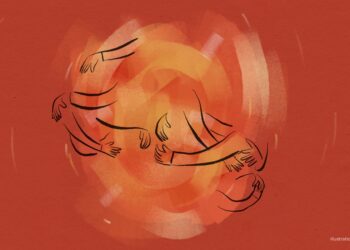Raw & Unfiltered
Reporting for the International Press While Armenian, Part III
Civilian reporting filled the information void left by the absence of international journalists during the blockade and ethnic cleansing in 2023 of the Armenians of Artsakh. Taline Oundjian looks at the benefits and ethical dilemmas, and the importance of local journalists in global reporting.
Armenia’s Commitment to Remembering the Yezidi Genocide
A crucial step in helping to prevent future genocides includes commemorating genocides and remembering their victims. The Armenian government recently designated August 3 as Yezidi Genocide Commemoration Day, becoming one of the first countries in the world to do so.
From Riches to Racism: The Enduring Legacy of Armenian Merchants
European stereotypes of the mercantile Armenians over the last 500 years persist in contemporary discourse among Armenia’s neighbors. Understanding the proliferation of these stereotypes and their origin is imperative for lasting peace in the South Caucasus.
A New Approach to Aging: Redefining the Journey
Amidst a lively gathering, seniors engage in therapeutic activities and form connections at the Memory Café, an initiative by Alzheimer’s Care Armenia promoting healthy aging and social interaction. What is the state doing about the country’s aging population? Gohar Abrahamyan explains.
Reporting for the International Press While Armenian, Part II
In the second installment of a series, Taline Oundjian examines the process of media information dissemination, offering insights into practical and theoretical aspects. This understanding sheds light on the challenges media encounters and its implications for coverage, especially in countries like Armenia.
Embracing a Culture of Kindness
While Armenians pride themselves for their hospitality towards foreigners, sometimes the same gesture isn’t extended to their fellow Armenians, particularly to those in need. If we could learn to embrace kindness and share this generosity, we could greatly enhance the well-being of all Armenians, writes Ella Kanegarian-Berberian.
Born Too Soon: Challenges of Premature Births in Armenia
When she unexpectedly had to deliver her first baby at 29 weeks, Hranoush Dermoyan had no idea what the journey ahead entailed. Weighing only 700 grams, her daughter spent the first 75 days of her life in NICU. The experience revealed emotional and medical challenges, and healthcare disparities in Armenia.
Reporting for the International Press While Armenian, Part I
Armenian journalists reporting on breaking news in Armenia and Artsakh for global media outlets frequently face scrutiny regarding their objectivity because of their ethnicity, suggesting an underlying bias that undermines their professionalism and reflects a covertly racist perspective.
We Know What War Means, Don’t Scare Us With That Word
Residents of the border village of Voskepar express concerns about the expected launch of the demarcation and delimitation of the Armenia-Azerbaijan border. Lilit Avagyan met with villagers to hear their perspectives firsthand.
Between Ownership and Neglect, Part 3: 54 Aram Street
Built in 1902 as a bank, and later functioning as a hospital, 54 Aram Street now stands neglected, its historic significance marred by decay. Despite recent approval for restoration, its fate remains uncertain and its owner, a former Minister of Health, isn’t divulging much information.












